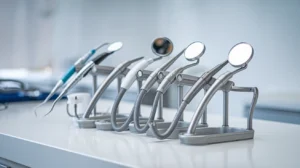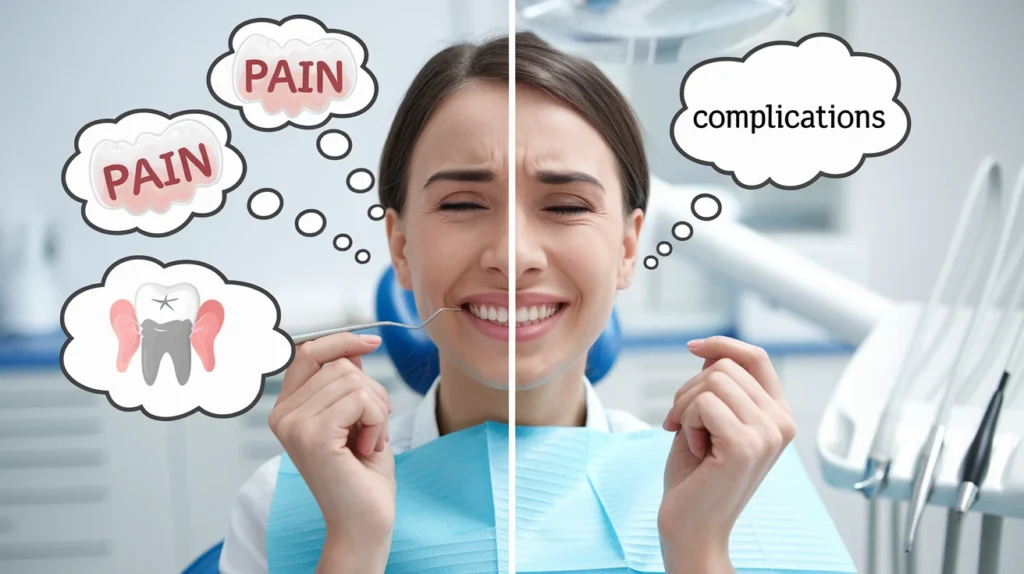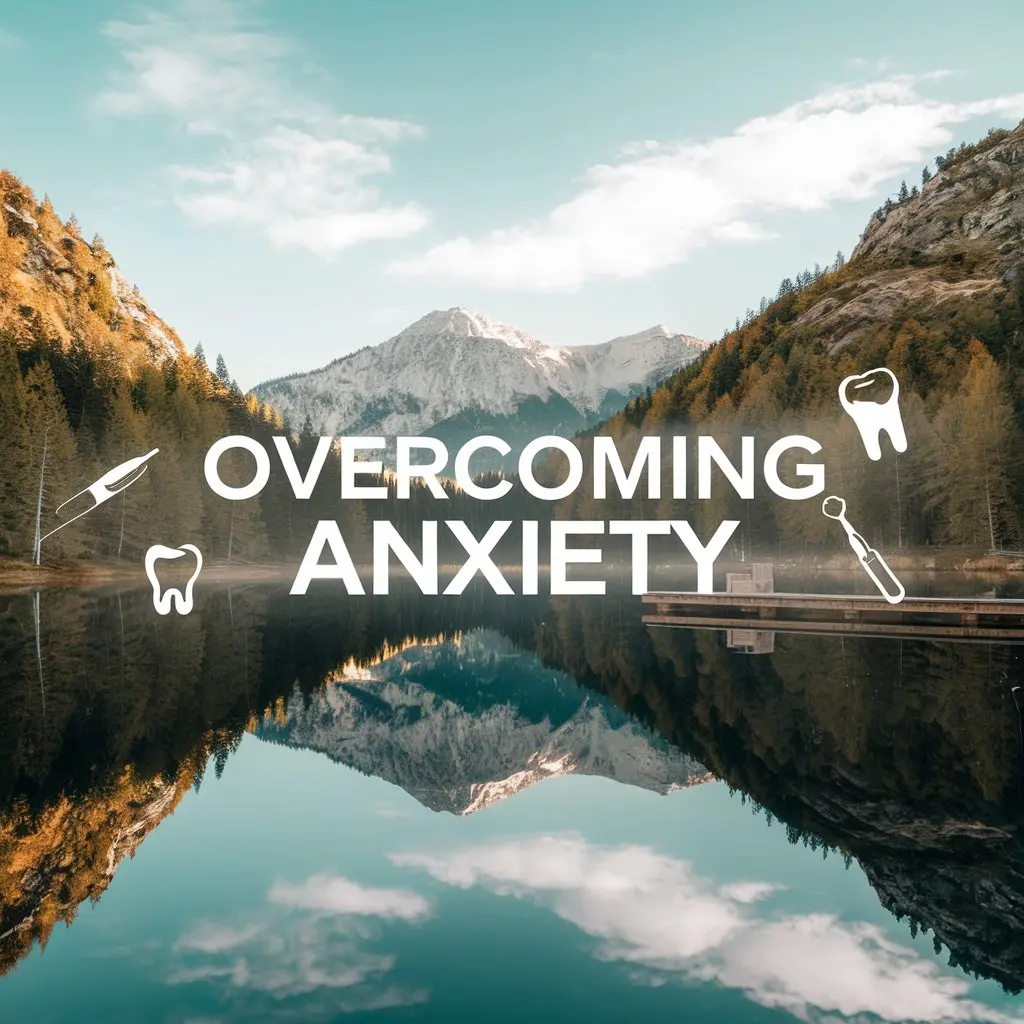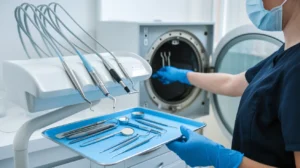
How to Choose the Best Dental Mouth Mirror for Oral Care
Picking the right dental mouth mirror might seem like a small task, but it’s actually pretty important for keeping your teeth and gums healthy. With so many options out there,

My patients often tell me about unexpected anxiety they feel days after their dental extractions, even after smooth procedures. As a dentist with over 15 years in practice, I know that post-extraction anxiety isn’t just common – it’s a real concern that needs proper attention and explanation.
Physical sensations combine with medication effects and the body’s natural stress response. These factors can trigger uneasy feelings that lead to overwhelming tooth extraction anxiety. This anxiety after dental extractions work can affect daily life and sometimes escalate into panic attacks.
This piece explains the medical facts behind these feelings. You’ll learn proven coping strategies and understand when your post-extraction symptoms are normal versus when you need medical attention. My goal is to give you clear, practical information to ease your wisdom teeth anxiety and support your recovery.
Being a dental professional, I’ve seen how patients feel more in control when they understand what causes their anxiety after extractions. Research shows that much of the population deals with dental anxiety. Some people develop such intense fears that they avoid dental care completely.
Your body’s response to dental extractions works in complex ways. Studies show that dental anxiety triggers nerve excitement and increases catecholamines in the body, which leads to physical changes you can measure. Many of my patients show faster heart rates and higher blood pressure even after they receive local anesthesia.
Pain and anxiety create a fascinating cycle during dental procedures. Research shows that nervous patients report more pain before treatment and expect it to hurt more during the procedure. This expectation can make the actual pain feel worse. My anxious patients often show these patterns:
Patient reactions vary a lot in my practice. Research points out that two out of 34 patients (8%) showed signs of Post-Traumatic Stress Disorder (PTSD) after their wisdom teeth came out. Pain severity during treatment predicts how bad PTSD symptoms might get, explaining 25% of the variance in symptoms.
The mental effects go beyond just the procedure. Studies show we don’t remember dental experiences exactly as they happened. Highly anxious patients tend to remember their dental pain as worse than it was, which affects how they approach future treatments.
This understanding helps me see that managing anxiety isn’t just about comfort—it’s vital for successful treatment. Early identification of nervous patients and using the right management strategies has become a key part of my practice.
My patients often experience unexpected waves of anxiety as they recover from tooth extractions. Their anxiety usually comes from not knowing whether their physical sensations are normal or need attention.
The body responds in several normal ways after a tooth extraction. These are the sensations you can expect:
My patients need to watch for symptoms that need immediate attention, especially:
Setting clear timeline expectations helps reduce anxiety after dental extractions. Most patients can return to their regular activities after 2-3 days of rest. The gum tissues and jawbone need several weeks to heal completely, even though you might feel better much sooner.
Physical symptoms can trigger psychological responses. Research shows tooth extraction can change heart rate, blood pressure, and body temperature. These physical changes often increase sympathetic nerve excitability and intensify anxiety.
Stress can slow down healing substantially. Research shows that patients under constant stress heal poorly and face more complications. The connection between physical symptoms and anxiety is vital – high stress hormones can suppress the immune system, which leads to more inflammation and slower wound healing.
Patients who know what to expect feel less anxious after tooth extraction. This knowledge gives them the confidence to tell normal healing sensations from genuine concerns that need attention.

My years of dental practice have shown that patients handle their post-dental work anxiety better when they grasp how tooth extractions affect their nervous system. The connection between your nervous system and dental procedures tells an interesting story.
Local anesthetics can affect your central nervous system within 1-5 minutes after injection. Your dentist’s role involves watching for early signs such as:
These responses are normal and usually go away as the anesthetic wears off. Between 0.2% and 5% of patients might experience temporary nerve-related complications.
Your brain goes through several changes while healing. Studies show that tooth extractions can affect various brainstem regions, including the trigeminal motor nucleus and facial nerve complexes. My patients often experience temporary changes in:
The inferior alveolar nerve, which runs through your lower jaw, causes the most common nerve-related concerns. Research shows this nerve can be affected during extraction, especially during wisdom tooth removal.
My practice takes an all-encompassing approach to handle these concerns:
Most nerve-related symptoms clear up within weeks or months. Patients who understand these neurological processes tend to feel less anxious after dental extractions. Specialized nerve monitoring and targeted treatments remain available to patients with ongoing concerns.
My years of treating dental anxiety have taught me that post-extraction stress management needs an all-encompassing approach. These are the most effective strategies from my practice.
Psychotherapeutic behavioral strategies can change a patient’s experience with minimal side effects. Muscle relaxation therapy has shown remarkable results in my practice. It works by suppressing the sympathetic nervous system’s responses. New techniques like auricular acupuncture show promise. They reduce preoperative anxiety by changing how the autonomic nervous system works.
Patient needs drive my medication choices. Studies show propranolol reduces dental trait anxiety by a lot. Here are the main sedation options I discuss with anxious patients:
Sedation dentistry remains safe, but patients should know about potential short-term risks such as:
My structured approach helps patients with severe post-extraction anxiety. Studies reveal anxiety treatment failure rates reach 88-91% for intravenous sedation and 61-70% for nitrous oxide after one year. These numbers highlight the need for detailed care.
Best outcomes happen when we combine multiple approaches. Research backs mindfulness meditation’s positive effects on cardiovascular parameters and biochemical outcomes. My recommendations often include a combination of:
Patients who receive proper anxiety management heal better and report improved experiences. Research confirms that effective anxiety treatment must reduce both surgical state anxiety and fear-related memories’ emotional impact.

My years of treating patients with tooth extraction anxiety have taught me that preventing future anxiety needs an all-encompassing approach beyond immediate post-procedure care. These strategies have worked best in my practice.
Psychological resilience is vital to manage anxiety after dental extractions. Studies show muscle relaxation therapy through four sessions helps reduce dental anxiety for at least three months. My recommended relaxation techniques include:
Research shows brief interventions of one to three sessions can help reduce dental anxiety long-term. My patients get the best results when they keep practicing these techniques regularly, not just during dental visits.
A positive dental mindset needs consistent effort to develop. Research confirms cognitive behavioral therapy helps retrain thoughts and reactions. My patients follow these steps to build a positive mindset:
Positive lifestyle changes support oral health and reduce anxiety during dental visits. Regular dental visits help maintain good oral health and prevent dental problems that could lead to complex procedures.
Professional support is essential to manage dental anxiety. Studies show a strong patient-dentist relationship significantly affects anxiety management. My practice uses several support systems:
Dental professionals who stay friendly, sensitive, and sympathetic earn their patient’s trust. We offer various support options to help manage anxiety, regardless of its severity.
Patients who work with these support systems show clear improvement in their anxiety levels. Research validates that psychological interventions benefit the medical and healthcare community’s well-being and emotional resilience.
Dental extraction anxiety affects many patients, but most find relief when they understand and manage it properly. My practice over the last several years has shown me how patients feel more confident and less anxious when they know about the extraction process, recovery timeline, and support options.
Medical approaches work better when combined with behavioral techniques and professional support to manage post-extraction concerns. Patients who get involved in anxiety management strategies have better outcomes and recover faster.
My experience shows that patients reduce their anxiety levels by a lot for future procedures through regular dental visits and positive mindset development. Professional support makes all the difference – dentists who keep communication open and provide complete care help patients overcome their fears.
Note that post-extraction anxiety won’t last forever and you can manage it. Physical symptoms might cause original concern, but knowing normal healing patterns helps you tell the difference between expected sensations and real complications. Your dental care provider wants to hear from you if you have questions or concerns during your recovery experience.
Anxiety after dental extractions can vary, but most patients start feeling better within 2-3 days. Complete healing of gum tissues and jawbone may take several weeks. It’s important to understand that some level of anxiety is normal and usually subsides as physical symptoms improve.
There are several effective strategies to manage anxiety after tooth extraction. These include practicing relaxation techniques like deep breathing and muscle relaxation, staying informed about the healing process, maintaining open communication with your dentist, and in some cases, using appropriate medication as prescribed by your healthcare provider.
Yes, certain physical sensations can trigger anxiety. Normal symptoms include mild to moderate pain for 2-3 days, some swelling and bruising, and minor bleeding in the first 24 hours. However, increasing pain, worsening swelling after initial days, continuous bleeding beyond 24 hours, or fever could be concerning and may heighten anxiety.
Local anesthetics can affect your central nervous system within 1-5 minutes after injection. You might experience temporary effects like lightheadedness, changes in vision or hearing, or mild disorientation. These responses are typically normal and resolve as the anesthetic wears off.
Building long-term resilience against dental anxiety involves several strategies. These include regular practice of relaxation techniques, developing a positive dental mindset through cognitive behavioral approaches, maintaining good oral hygiene habits, scheduling regular preventive check-ups, and fostering open communication with your dental team. Consistent engagement with these strategies can significantly reduce anxiety for future dental procedures.

Picking the right dental mouth mirror might seem like a small task, but it’s actually pretty important for keeping your teeth and gums healthy. With so many options out there,

Dental mirrors have come a long way. From simple reflective tools to sophisticated gadgets, they play a key role in modern dentistry. With constant innovation in dental mirrors, these aren’t

Hey there, dental pros! Today, we’re diving into something super important but often overlooked—how to properly mouth mirror sterilization. If you’re in the dental field, you know these little tools
At The Surgical Kit, we are committed to providing healthcare professionals with the finest tools to ensure precision and safety in every procedure.